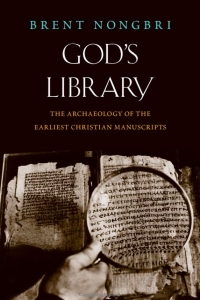A couple days ago, the news broke that Hobby Lobby has sued Professor Dirk Obbink for over $7 million USD.
The 10-page complaint (which can be seen here) does not paint a nice picture of Prof. Obbink, but that’s generally how this genre works. We await Prof. Obbink’s response to these accusations.
Four items jumped out to me in the complaint:
First, the complaint lists seven purchases between February 2010 and February 2013. So, the stolen Oxyrhynchus papyri were being sold at least as early as 2010.
Second, we get another number for the stolen fragments:
“To date, thirty-two (32) items have been identified as having been stolen by Obbink from [the Egypt Exploration Society] and sold directly to Hobby Lobby. The investigation continues.”
The number here is interesting. According to the various announcements from the Egypt Exploration Society (EES) over the last couple years, the Museum of the Bible had returned 34 total fragments to the EES (13+21), but the key phrase in the complaint is “sold directly to Hobby Lobby.” Recall that two stolen Oxyrhynchus fragments were sold to Hobby Lobby through Khader M. Baidun & Sons/Art-Levant Antiquities of Israel. It makes me wonder if other Oxyrhynchus materials might have been dispersed through that channel.
Remember that between the Museum of the Bible and the American collector Andrew Stimer, who is said to have bought 6 stolen EES fragments from a business partner of Prof. Obbink, a total of 40 pieces have been returned to the EES. Now, the EES has said that 120 papyri are missing from its collection. That means 80 Oxyrhynchus papyri remain missing. Is the possibility of dispersal through Baidun being investigated?
Third, it’s interesting to see that Hobby Lobby seems to be suing Prof. Obbink for the cost of all of the stolen fragments:
“The fact that some unknown number of the Fragments were stolen renders all the Fragments unsalable and worthless to Hobby Lobby, which stands to lose both the Fragments and the entire value of the Purchase Price it paid to Obbink.”
Now, four of these fragments (the four so-called “first century” gospel fragments) were never delivered to Hobby Lobby, and they were thus never donated to Museum of the Bible. But at least some, and perhaps most or even all, of the rest of the stolen items were delivered to Hobby Lobby and then donated to the Museum of the Bible. They had MOTB inventory numbers. A stolen Oxyrhynchus fragment of Romans [P.Oxy. inv. 29 4B.46/G(4-6)a], for example, was once known as “MOTB.PAP.000425.” It’s my understanding that these designations mean the fragments were donated by the Greens/Hobby Lobby to Museum of the Bible (I’m happy to be corrected if that is an incorrect inference). As Candida Moss and Joel Baden reported, these donations generally resulted in tax deductions at a much greater value than Hobby Lobby paid for the manuscripts: “The magic ratio for the Greens was 1:3: for a given investment to be financially viable, they had to be able to write it off at three times the amount that they purchased it for” (Moss and Baden, Bible Nation, p. 24).
So, in effect, the Greens seem to have already been paid by American taxpayers for perhaps triple the amount they paid Prof. Obbink for at least some of these fragments. Should Hobby Lobby prevail in the lawsuit, I wonder if they will be refunding some of those tax break profits back to the American taxpayers?
Fourth and finally, it’s a little surprising that the payments for the stolen fragments are all said to have gone to a bank account in Michigan. It’s still not clear to me how much access Prof. Obbink had to the large unpublished collection of papyri at the University of Michigan during his days on the faculty there, when he was “Ludwig Koenen Collegiate Professor of Papyrology.” As I noted on an earlier occasion, it seems like Michigan was a bit of a hub for the trade in ancient manuscripts. There could be more to this part of the story. But as I said, we await Prof. Obbink’s response to the allegations.



The taxpayer might have paid HL the same amount they paid Obblink, not treble. The taxpayer lost the tax proceeds, not the inflated value. The treble amount sheltered income from taxation, perhaps at a 33% rate, hence the breakeven.
The complaint accurately sums the 7 transaction prices as 80000+500000+350000+2400000+1345500+609600+1810000=7095100. It acknowledges that Obbink returned $10000, but doesn’t account for that in the “relief” it’s seeking
Brent, have you see the detail reported here: https://bit.ly/2Sfau3N that Obbink was given a loan(!!!) “by his college a year after concerns were first raised about his integrity” and further that he “was handed a six-figure loan 12 months after a UK charity that archives and translates Greek manuscripts discovered in Egypt expressed concern about his behaviour”? This is the first I’ve heard of this loan.
Yes, this fact came out last year (https://www.thetimes.co.uk/article/oxford-don-held-in-theft-case-was-given-huge-help-by-christ-church-college-zncv0lc66). It seems to be a common practice at Oxford, but according to the Times article in the link, Prof. Obbink’s loan was larger than normal.
Ahh ok, I must have completely missed that.
I believe that the loan was secured by a mortgage, and was a pretty good business plan for the University, because of the secured nature of the loan.
A couple of new developments in the case briefly described at https://www.pacermonitor.com/public/case/40480193/Hobby_Lobby_Stores_Inc_v_Obbink , but it looks as though it’s not possible to see more without paying. Still, the professor has apparently been ‘served’.
Thanks for the update.
Pingback: Update: Hobby Lobby vs. Dirk Obbink | Variant Readings
Pingback: Update on Hobby Lobby vs. Obbink Case | Variant Readings
Pingback: The Hobby Lobby v. Dirk Obbink Ruling | Variant Readings